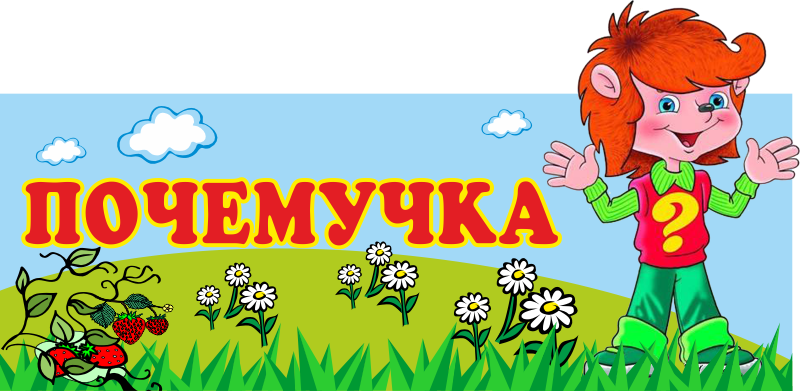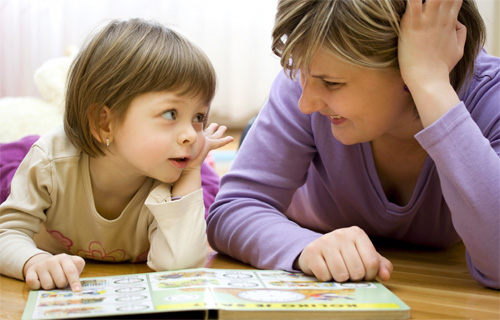“Mom, why is the wind blowing”, “Why is rain dripping from the sky?”, “Why is the ice melting?”, “Why are the chickens yellow and the chicken white?”, “Where the babies come from"… etc. - such questions of the baby at first cause a sense of pride among parents. The curiosity of the child is perceived as evidence of its full development. And mom and dad pick up handbooks, leaf through encyclopedias, look for answers on the Internet and talk with specialists for the sole purpose of explaining to their crumbs why this happens and what it is connected with.

But the flow of questions does not stop, and the inspiration of parents is gradually replaced by tiredness from constant "why?"finding answers to which is simply impossible. “Mom, why do stars shine at night, but they are not visible during the day?”, “Why does the car go?”, “Why don't hamsters brush their teeth?”, “Why is blood red and not black?. Excessive "meticulousness" in the study of the world begins to bore mom and dad and over time causes only irritation. What to do in such cases? How to respond to baby's questions?
How to respond and answer constant children's questions: what? Where? when? what for? and why?
First of all, do not be nervous. Your child is growing and has reached the very age that psychologists call “Age of why” (3 - 5 years old. At this time, the child is most actively interested in everything that surrounds him). Find the strength in yourself and try to understand your baby, because the world is so big and interesting - he wants to know absolutely everything about him!
When does the "age of why" begin?
A few months ago, the baby was not particularly talkative, he was a quiet and calm child. Today, he does not give rest to his parents, his questions strive to confuse the logic of adults. Infinite “why? and why?" catches up with them, wherever they are: at home, in the park, in the store. This is due to the fact that your child has reached a "special" age, when he is interested in knowing everything about everyone. This period of development usually falls on the most interesting childhood - from 3 to 5 years.
How do moms and dads behave in such situations? Some persistently try to remain calm and answer all questions as they come. Others are trying to translate the topic, so to say “evade” the answer so as not to drop their authority in the eyes of the child with their “I don’t know”.
Keep in mind that the latter option will not suit your baby at all. He will "torture" you, no matter what. If you decide to dissuade and say the first thing that occurred to you, the child will immediately feel it.You will expect a new series of questions clarifying your answer. Therefore, if you “suddenly” do not know something, promise the baby to answer this question a little later, say: “I need to clarify something so that I can give you a detailed answer.” Reassure yourself that such a “test” is passed by all parents.
From the forum
Catherine: somewhere I heard the wording: “This is a difficult question. I can’t answer him right away, I need to think. ” Then, when there is an answer, you raise the topic itself and tell it, if still interesting. But this is not for frequent use.
Do not be afraid to get into a mess
If the question has perplexed you, don’t get mad, leave the answer, or don’t answer at all. Better admit that you do not know the answer, but be sure to read about it in a smart book and later tell the baby. Well, if there are children's educational books, then you can look for the answer to the question with the child.
Some features of the logic of children
It’s funny to watch how the period of “pochumuchki” begins in children. First, the baby, as if by chance, silently, begins to voice out loud what he saw and comment on what is happening. For example, while walking on the street, he notices a butterfly and begins to reason with a small voice: “What a beautiful butterfly ... Why is she sitting on a flower? What did she find there? Maybe she wants to smell him? .. Or is she hiding from someone? .. "
It seems that he is talking to himself and does not expect any explanation from you. And if you begin to explain to him exactly what that butterfly on a flower does, you will have the impression that he is not listening to you. The kid simply continues to observe the object of study and draw his conclusions, thinking about the oddities of the world.
Please note that these arguments are precisely his first not yet voiced "why?" With each day of thinking, there will be more and more out loud thinking, they will sound louder, and after a while they will be completely replaced by the questions specifically set before you.
Keep in mind that the baby expects from you only truthful, comprehensive answers.. No "You're still small, why do you need this?" or “Wow, how curious we are!”. We say “no” to the gibberish and reproaches about his excessive curiosity. Kids are very touchy with such adult behavior.
They will “sulk” if you do not answer them and get angry if you tell a lie. They will frown, distract you from your affairs, endlessly fiddling with your stubborn: "Well, tell me why, well, tell me!". This question of a child seems silly and unimportant to you, but for him your answer may lie in the secret of the mysteries of the universe, the whole world into which he tries to penetrate with his inquisitive mind and realize his role in it, find his place.
Answers to children's questions should be informative, expressed in a simple and accessible language for them. Children should understand what you mean when they answer their question. In addition, you should strongly encourage the kids in their quest to know everything - be patient with their curiosity, be friendly and demonstrate your willingness to respond to their next stream of “why?”.
The desire to know the world in children at this age resembles a tsunami, sweeping away everything in its path. Brain activity reaches a maximum, speech develops, thinking surprises with its eccentricity. The vocabulary is replenished with various expressions, the baby, as it were, is trying to express himself with his tongue. Fantasy in children during this period is revealed more than ever, therefore many mothers and fathers consider its manifestation to be excessive.
How to react to parents?
In no case should parents protest against the manifestation of children's imagination. Do not offend your baby with this attitude to his feelings of the world. It is better to distract from everyday affairs, try to dream with him, to come up with unusual fairy-tale characters - you will get great pleasure from this: the childhood world smells of magic and freedom of thought.
[sc: rsa]
Ask your child how he sees the world, and you will be surprised at what you hear from him.We, adults, have not thought about many things for a long time and forget why this or that event occurs. The kid will find "his" explanation for everything, tell why the fish swim and how the plane flies. Of course, these explanations are not always true, but how fantastic they sound!
Children like to explore this world in the company of adults. But, even if you do not find the time to become a "companion" on this journey, believe me, they can quite cope without you. Get ready for the fact that in search of answers to all your questions, your baby can make out the alarm clock, pick out all the buttons on the remote control from the TV, try to put a rusty nail in the socket and open all the taps in the bathroom to see how water will pour out of it.
To understand what motivates your child, mom and dad need to remember their childhood. Do not infringe on the interests of your crumbs and do not extinguish the "fervor" of his curiosity. Try to behave so that the baby considers himself a discoverer. Get involved in this game. He needs your support. Rejoice at his “discoveries”, praise him more often, because he so needs your approval.
Answer calmly and clearly
Do not dismiss the child, do not say that you are tired of his questions. It depends on how you talk with the child whether he will have a desire to further study the world around him. When answering questions, try to make explanations accessible to children.
What threatens parental laziness?
Refusing to answer all the questions of the child and, without helping him in understanding the world, you risk bringing a lot of problems to him in the future. For example, hearing unchangeable "Do not bother, you see, I'm busy!" or "How tired of your questions!", the child will gradually lose interest in research and this will miss many opportunities.
Your behavior will come back a bit later when he goes to school. There, the kid will not show special zeal for knowledge, the lessons will be for him a real torture - he will be bored. Teachers will start complaining about him: “He is not interested in anything at all. He yawns all the time in the classroom! ”. But before this kid was so curious, but no one supported him, did not encourage him, did not give him due attention. So the light of his interest in life went out.
Stimulate the activity of your child, be surprised at his quick wit, observation. When you meet your kid from kindergarten, do not rush to ask what they were given for lunch. You’d better learn what he’s learned today: “What did you do today for a walk?” or “What interesting things did you learn today? What did you see?". His new experiences are what should interest you every day.
We learn the world with a child

It is difficult for an adult to plunge back into childhood in order to understand the thoughts of a child. For this, a few simple but very effective tips will come in handy:
- Organize any joint activities. So you can find out what your baby is thinking and how. Contribute to the "outpouring" of his questions. Respond to them enthusiastically.
- Buy beautiful illustrated books and encyclopedias. View pictures together, discuss them. Invite your animals and birds to come up with their names. It will be funny and allow you to understand how your child thinks.
- Play various collective games with two or more participants, invite friends of your “why-you-know” and other family members for hanging out at the games.
You can adopt games that you remember from your childhood, or ask a kindergarten teacher what games children of this age love most. Consult with psychologists about what games contribute to the development of children and arouse their interest in exploring the world.These can be quite simple games that do not require special skill or preparation.
Examples of exercises for children
1. "A series of questions"
This game can last forever. Start with any question, for example: "Where does the water come from in the lake?". The answer may be this: “When it rains, water accumulates in the lake”. The following question from you may be: "Why is it raining?".
This game can be continued for a very long time. If your baby finds it difficult to answer a question, help him, explain for yourself. Such a game will show the child how much he already knows, and it will allow you to “shine” with your mind, so your authority in the eyes of a little man will grow significantly.
If you also don’t know something, it’s not at all scary. You can say: "Wow. I myself (a) do not remember why this happens. Let's see together what is written about this in the book ”. Believe me, firstly, it will bring you closer to the baby, because together you do not know the answer to this difficult question, and secondly, he will learn from you to look for answers in books and encyclopedias. In the future, this communication skill with such literature will be very useful to him.
2. "What happens ...?"
This game is designed to develop the logic of the kids and the ability to compare objects to each other in their size, width and length.
The game can begin with any question, for example: "What is a house?". The child answers: large, beautiful, white, multi-story. Then you can ask to compare the size of the house and the mountain. The kid will imagine the height of the house and the mountain. The mountain will be higher. He is learning to compare.
Then invite the child to characterize the road. The answer will be: long, short, wide, narrow. Then you ask: “What happens wider - a road or a path?”. “Of course, the road!” - the baby will answer.
Observe which questions your child likes best - about animals, nature, people, or household items. If he likes to talk more about the house, ask the question: “And what happens in our house is green?”. He will answer: an apple, flowers in a pot, a curtain in the kitchen, my dinosaur ... Stop at one of the items listed by him and ask him to add his characteristic: “And what else is an apple (a curtain in the kitchen or flowers in a pot)?”. The kid will begin to list you: sour, sweet, hard, soft, round.
If you play such a game often, your child will clearly understand the difference between many objects and will learn to compare them in many ways.
3. "The interrogator"
Take any picture with a plot and suggest the child to ask you what he does not understand in this picture. If you cannot answer, he answers instead of you. Then you lose. And ask the baby to make a story from this picture in order to “voice” the plot. Such a game will allow him to fantasize and show his knowledge.
4. “We come up with new things”
Take old pencils, unneeded pen caps, chocolate foil, a plastic cup from eaten ice cream and invite the child to come up with a new application for them, to make something new out of them. He will be interested in becoming an "inventor."
5. "Transformation"
Tell the baby that he can transform into something that he wants. Ask him to tell how he feels after the transformation, how this thing lives, what she thinks and what worries her. Let her talk about her thoughts, about the past and the future.
Play together
1. Loved by many children, the game "What flies?"
First, choose a leader (usually a mom). The host begins to quickly ask: “Does the TV fly?”, “Does the car fly?”, “Sparrow flies?”. Responses should be immediate - yes or no. You can shout them out, or you can agree to wave your hands when the answer should be “yes” and not wave when “no.” The game ends when the participants collect enough points (this is negotiated immediately).
2. "Finish the phrase"
You will need a ball or any other object that can be passed from hand to hand. The game consists in the fact that the one who holds the ball (adult) starts a sentence, for example: “It snows in winter and in summer ...”. The one to whom the ball (child) is transmitted must finish it: “It is raining.”Together with the answer, the participant must return the ball back. “Fruits grow on trees, and on beds ...”, “Squirrel jumps on branches, and a dolphin ...”, “An artist paints pictures, and a cook ...” - you can go on ad infinitum.
3. "Finish the word"
You name the first syllable of the word, the baby must come up with and name the second. It is not necessary that he guesses exactly your conceived word. The main thing is his ability to select words for a given syllable. Then switch roles with the baby - he now calls the beginning of the word, and you end. This game will significantly replenish and expand your child’s vocabulary.
4. "Specialist in professions"
The game is pretty simple. You say: "What is ... a fireman doing?" The kid answers: "Extinguishes the fire." You: "What is the ... teacher doing?" "He teaches children!" - the child answers. Start with professions known to him: baker, doctor, builder, nanny. Then move on to professions unknown to him: engineer, veterinarian, stewardess. If he cannot explain himself, help him - tell him what the engineer does, for example, where he works.
5. "Who will name more subjects ..."
Round, square, triangular, cold, hot, sweet, etc. The game is that you take turns with the baby to name objects of a certain shape or sign, who is larger. For example, you tell him: “What square objects do you know?” He will say: “Cube”, you tell him: “TV”. You continue: "Carpet in the living room."
The game should stop at his word, let the baby be the winner in this game. This will increase his self-esteem and teach him to think big.
It’s good if you belong to the number of parents who are willing to participate in the development of their baby, despite the problems with fatigue and lack of time. It is very difficult to find the strength to constantly "work" as a reference for your baby. But, believe me, this stage will not last so long. And when it ends, you will recall it with emotion.
Be sure that your efforts will certainly be rewarded - the baby will learn to draw conclusions, connect things that are different in nature and understand the essence of the events. You will become truly happy when you realize that it is all your merit. After all, for him you are the closest and dearest person who first came to his aid in studying the world.
We also read:
- Top 10 children's questions that perplex parents (and how to answer them). Part 1
- The child found you in the bedroom for an "interesting occupation." What to do and how to find the right words?
- Awkward kids questions - how to answer?
- How to explain to the child where the children come from
Joke on the topic:
Little son asks dad:
“Dad, why is the grass green?”
- And FIG knows her.
“Dad, why does it snow in winter?”
- And FIG knows him.
“Dad, why are stars only visible at night?”
- And FIG knows them.
- Dad, I probably bothered you with my questions?
“No, son, you ask.” Who will explain everything to you, except for the folder? :)
Lecture "Parental pedagogy: the age of why." The lecture is delivered by T.D. Yakovenko, teacher of children's literature and psychology of NGPU:










I believe that everything should always be explained to the child, and not to brush aside questions. It’s a pity that now parents often don’t have time for their child, so the children are removed from adults, withdrawn from themselves or start looking for those who will give answers to their questions
We have just ended this period. Frankly, it was morally difficult to deal with a child during this period. My husband tried to share responsibilities even for one period of time. For example, the day I answer the constant “why”, the second day - the husband. It helped to relax and rest from the child, by the way. 🙂
I don’t have children yet, but I really want this. I work in a field where creative ideas are needed. And young children are just a bunker with millions of extraordinary ideas, thoughts and statements. My girlfriend has a little charm. I love talking to him. After all, the truth is, he looks so differently at ordinary things, I would never have guessed it myself. It's nice to look at the world with a children's eye.
At one time, I insanely got my parents out with similar questions, and as a result, we had a complete collection of Avant + encyclopedias. Now that it’s my turn to answer the endless “why,” it seems to me that this was a wonderful decision - not only is it informative, we are also developing love for books)
Oh, what a familiar situation) Sometimes you get so tired of this hail of questions, but it’s important to answer and learn so that the child develops and becomes smart. It is better when the baby is interested in everything in the world than when he is not indifferent to everything.